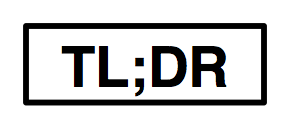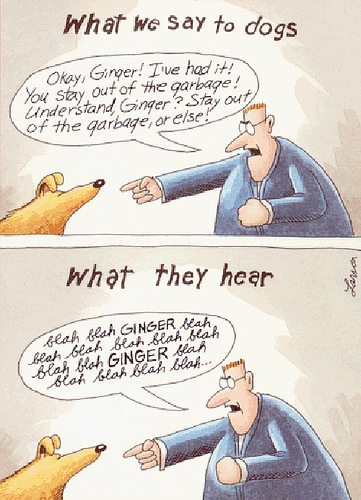Stop writing for people. Start writing for search engines.
I’ll wait while you run to get your pitchforks and light your torches. I know it sounds like heresy but I ask you to hold your judgment.
Search Engines Emulate Human Evaluation

The goal of search engine algorithms is to emulate the human evaluation of a site or page. This is not an easy task. In fact, it’s a really difficult task. Think of all the things that you tap into when you evaluate a new website. The amount of analysis that goes on in just a few seconds is astounding.
The thing to remember is that search engines want to be a proxy for human evaluation. They’re trying to be … human. Don’t lose sight of this.
Search Engines Are Not Smart

But for all of that effort, search engines aren’t smart. The name of my blog is my opinion of search engines: a search engine is like a blind five year old.
The blind part comes in because they don’t care about how pretty your site is or the gorgeous color palette you’ve selected. Mind you, visual assessment is a factor humans use in evaluating a website, but search engines aren’t able to do this.
Why a five year old? For all of the advances search engines have made, they’re still not ‘reading’. They’re performing text and language analysis. That’s a huge distinction. Really. A Grand Canyon type of distinction.
A search engine would likely fail a basic reading comprehension test.
Knowing this, you need to take steps to make it very clear what that page is about and where the search engine should go next. This helps the search engine and … ultimately helps people too.
First Impressions Matter
For a number of years I ran telemarketing programs. (University fundraising if that makes you feel better about me.) What you find out is that you have only 7 seconds to convince a person to stay on the phone. They better hear something worthwhile fast or else you’ll get the dial tone.
It’s no different online. With high speed connections, tabbed browsing, real-time information and an environment where anyone can publish anything, that first impression is incredibly important. In a few seconds users are determining if that content is authoritative and relevant.
Is it any wonder why tools like FiveSecondTest and Clue have become popular?
People Scan Text
Did you know that the P.S. line is one of (if not the) most read parts in a direct mail solicitation? It is. People naturally gravitate toward it. They’re far more willing to read the P.S. line than any of the body copy.
And we see this behavior online too. Research by Jakob Nielsen shows that most readers scan instead of reading word for word.
People rarely read Web pages word by word; instead, they scan the page, picking out individual words and sentences. In research on how people read websites we found that 79 percent of our test users always scanned any new page they came across; only 16 percent read word-by-word.
Another study showed that even those who ‘look’ at your content are only reading between 18% and 28% of it.

Have you seen this spring up around the web lately? It stands for too long, didn’t read. It’s used to summarize content into a sentence or two. It can be used at the top of content or at the bottom. At the bottom, it serves as a close cousin to the tradition direct mail P.S. line.
But why exactly are we seeing tl;dr? Could it be that the content we’re writing just isn’t concise enough? That it’s not formatted for readability? It’s your job to make it easy for people to understand and engage with your content. Keep it simple, stupid.
SEO is more than tags and links. Today SEO is also about User Experience (UX).
The Brain Craves Repetition
There’s an old adage in public speaking that only a third of the audience is listening to you at any given time. This means that you have to repeat yourself at least three times to get your point across. A recent Copyblogger post touched on this subject.
The brain can’t pay attention to everything and it doesn’t let everything in. It figures anything that is repeated constantly must be important, so it holds on to that information.
I also believe in a type of visual osmosis. When evaluating a page for the first time, words that are repeated frequently make an impression, whether they’re specifically read or not.
People instinctively want consistency. They want to know that they’re reading the right thing, in the right way, in the right order. They want to group things. That’s one reason why ‘list’ posts are so popular.
Apply Steve Krug’s ‘Don’t Make Me Think‘ philosophy to your content. Not just for search engines but for people.
Stop Using Pronouns

Why use that pronoun when you can use the actual noun instead. Sure, you know what you’re talking about and the reader might, but putting it in ensures that the reader (who is not nearly as invested in your content) is following along. And our dear friend the search engine is also better served.
Having that keyword noun in your content frequently doesn’t make it worse, it makes it better. When you read it, it may feel bloated. But the majority of your readers are skimming while the minority who are truly reading will simply not see those extra nouns. In fact, they become a bit like sign posts.
Here’s an example from the world of books: dialog! What if you didn’t attribute dialog to a specific person.
“I want Mexican food,” he said.
“No, lets get Italian food,’ he replied.
“Can’t we meet in the middle?’ he queried.
How many people are talking? Two? Three? Perhaps one if you’re a Fight Club fan.
Now lets add the names back in.
“I want Mexican food,” Harry said.
“No, lets get Italian food,” Ron replied.
“Can’t we meet in the middle?” Tom queried.
Now I know there are three people talking. And as that dialog continues (as dull as it might be) I’ll use those names as sign posts so I know who’s saying what. But will I actually ‘read’ each instance of that name? Probably not. You’ll pick up the cadence of the dialog and essentially become blind to the actual name. Blind until it becomes unclear and then you’ll seek that name out to clarify exactly who said what.
When people scan they need those sign posts. They need to see that keyword so they can quickly follow along.
Web Writing is Different
When people say you should write for the user, they mean well. In spirit, I completely agree. But in practice, it usually goes dreadfully wrong.
I’ll never forget my first job out of college. I was an Account Coordinator at an advertising agency. One of my jobs was to write up meeting notes. As an English minor I took a bit of pride in my writing skills. So it was a great shock to get back my first attempt with a river of red marks on it.
What had I done wrong?
I wasn’t using the right style. Meeting notes isn’t literature or an essay. I didn’t have to find a different word for ‘agreed’ because of my dislike of using the same verb more than once (twice at most). No, I was told that my writing was too ‘flowery’ and that I needed to aim for clarity and brevity.
I’m not saying that writing for the web is like writing meeting notes. But I am saying that writing for the web is different!
So when you tell someone to write for the user, they usually write the wrong way. They write thinking the user is going to be gorging themselves on every word, giving the content their full attention. They think the user will appreciate the two paragraph humorous digression from the main topic. They’ll want to write like David Mitchell or Margaret Atwood. (Or maybe that’s just me.)
Robots Don’t Understand Irony

To my knowledge, there is no double entendre database, nor a irony subroutine or a witticism filter in the algorithm. Do they have a place in your writing? Sure. But sparingly. Not just because search engines won’t understand but because, like it or not, a lot of people won’t get it either.
Everyone might not get the inside joke … like why I used the image of this particular novel above.
Write for Search Engines
Make sure they know exactly what you’re writing about. Stay focused. Break your content up into shorter paragraphs and use big descriptive titles. Avoid pronouns and don’t assume they understand what you just said in a previous paragraph. Keep it simple and give them sign posts.
Write for people the right way. Write for a search engine.
The Next Post: You Don’t Count Friends
The Previous Post: Find Keyword Modifiers with Google Refine

16 trackbacks/pingbacks
Comments About Stop Writing for People
// 30 comments so far.
Arnie // January 17th 2011
When I saw the headline I was totally prepared to disagree. Being a content person I would always say write for people, then optimize. But you make some pretty valid points and afterall the goal for many of us it to get found first, then read.
aj // January 17th 2011
Yes, I didn’t even touch on the fact that you need people to find your content in the first place. By writing for a search engine you’re simply writing more web friendly, focused content. Not only will it help users find you via search, when they do find you – it will be highly relevant and valuable to them.
Aaron Bradley // January 17th 2011
Blasphemer! At least, that would be the stock take on your post. The “prevailing wisdom” is that if you write “content” (whatever that means) for users, the search engines will somehow ingest your noble intentions by osmosis, and reward you with high rankings.
Which is why this is a refreshingly blasphemous post. Yes, there is value in writing for users – but, as you so convincingly argue, writing for users with an understanding of how web content is actually consumed online.
I think it would be interesting to revisit the “content farm” debate by reframing it in this context. Articles on content farms are very decidedly written for the search engines. But if this process also provides users with information that they can readily scan and digest, isn’t that also providing value to users? Put another way, by giving the search engines what they want, isn’t one also providing users with what they want? I certainly think there’s an argument to be made there.
aj // January 17th 2011
Exactly!
And you’re right about many ‘content farms’. An eHow article might not be a masterpiece but it’s laser focused and incredibly easy to read. In general, they give you everything you need, and nothing you don’t.
David Malmborg // January 17th 2011
I completely expected you to have a TL;DR at the end of this post… but then again, I guess you wrote it for Search Engines 😉
Great post thanks!
aj // January 17th 2011
That would have been clever! *wishing I’d done that*
Thanks for the kind words and comment.
Learn SEO // January 17th 2011
Search engines are geting as clever as humans with time 🙂
anthonydnelson // January 17th 2011
I agree with this post. I have three goals in content creation. First and foremost, you need to use the correct keywords giving the page the ability to rank. Secondly, your page needs have content that is good enough to help your reader convert (sale, email sign-up, rss, whatever). Finally, you hope the content is interesting enough to naturally attract a few external links.
Marc Bitanga // January 17th 2011
The general consensus when it comes to writing for the web is; humans first, search engines second. But what most forget is that search engines typically make up the majority of external traffic sources. So if you ignore search engines in your writing, humans won’t get a chance to read it at all. A fine balance only experienced web savvy writers know how to accomplish.
Kevin // January 17th 2011
I think I got the pun….and that is one of the best books ever written.
facebookguru // January 18th 2011
Nice and informative post for whom working and writing contents for Humans now writing for Search Engines at least they give you response your work deserve.
Zunaira Karim // January 18th 2011
Great title, I definitely was pitchfork ready when I saw it! I have to agree with Marc, I think that writing content for a website needs to have that balance of SEO and something that users can connect to.
Tim Vickery // January 18th 2011
The method of writing you describe sound like human repellent. The golden rule of search engine optimization is write the content for humans — but title, describe, and label your content for search engines to facilitate the connection between you and searchers.
Doing everything for search engines will result in a very high bounce rate — and being penalized by the search engines. Humans are incredibly complex creatures, whereas a search engine is a computer program designed to compile website indexes and list those websites according to decreasing authority. A search engine could never interpret something as complex as humor or wit — so why bother trying to accommodate it…???
Wikipedia — which dominates the search results is written purely for human consumption, but labeled for search engine clarity. Use this as your model.
aj // January 18th 2011
Thanks for your comment Tim and you’re certainly entitled to your opinion.
But perhaps I didn’t make my point clearly. Of course you write for people, but most don’t do a very good job of that. By writing for a search engine, you actually write much better content for people. Applying what we know about reading behavior, we can create content that is far more satisfying, resulting in a much lower bounce rate. This is where SEO and UX intersect.
Writing blocks and blocks of text without any structure or focus and then applying some titles and labels for search engines isn’t my idea of a superior experience for humans or robots.
And I agree that Wikipedia is a great example. Wikipedia takes advantage of scanning behavior and our desire for consistency with a very structured layout. In addition, the text is laser focused on each specific subject and is continuously refined to be so. Editors regularly take people to task for being too ambiguous. And it doesn’t hurt that they’ve got hundreds of millions of backlinks too.
Julia Vyse // January 18th 2011
Oh dear. Here’s a freebie: the plural of index is indeces. The action of indexing something in the present tense is ‘indexes’.
Give this a quick read through and maybe next time your complaint will be more coherent (that means ‘understandable for the humans’)
http://juliavyse.wordpress.com/2010/02/04/grammar-matters/
Erik Holladay // January 19th 2011
I very much enjoyed reading this article and the humorous twist is creative and entertaining. Thanks! I agree that in order to GET FOUND via organic search, your content MUST be highly ranked by search engines. To get highly ranked means one must write for search engines. Getting found is a major requirement to getting leads from customers.
HOWEVER / AND, simultaneously the content must also be compelling to the human visitor so that they contact us… good lead generation or another positive action is the ultimate goal.
Getting search engines to rank my webpages high for organic search is a top priority, and getting qualified prospective customers (people), to call, email, chat, or send a webform enquiry to my company is the highest top priority. SEO is a means to the end. Develop webpages and websites while paying attention to search engine optimization is great for business.
Bill Rowland // January 19th 2011
AJ
Great post and timely too. I’m in the process of working with some clients on improving content creation for their websites and the points you make underscore the much of what I’m trying to communicate.
Finally, your cartoon selections are superb. Envisioning Google as Homer Simpson is right on and the Ginger cartoon is my favorite Farside.
aj // January 23rd 2011
Thanks for the kind words Bill, particularly the image selections. I take a lot of time (perhaps too much) in selecting the right images.
Chris Alta // February 24th 2011
I completely disagree with this. If your only focus is getting found in search engines to say build up your blog site then that’s not good. Readers will come and go and that will be that. But if you just stuck with writing for people then people would talk about your post and spread it via word of mouth.
It’s better to have Quality readers than Quantity.
Quality readers who engage in the conversation and actually have a voice and are interested in what’s going on is who you want. Not someone who just happened to search what keyword you’re targeting. If they do that they can come to the page, skim a few words and then move on. Your bounce rate for a particular post would be through the roof. If you want to keep readers the readers themselves need to be referred via word of mouth.
Say you wrote a post on fishing rods. Someone could merely be doing research on fishing rods for some fishing class they’re taking and then once they’re done with that they never come back to your site.
Now if your content spread via people and word of mouth, that’s building trust. When people trust you and build a relationship with you through all of your readings they’ll probably go and tell someone else about it. Now you not only have 1 but 2 quality readers, then they tell so and so and so on.
I actually just wrote a post on this on my website if anyone wants to join the debate then come on over and check it out. Other than that I respect your opinion and to each his own.
debating post
http://chrisalta.com/writing-for-people
cheers!
-Chris Alta
aj // February 24th 2011
Chris,
Thanks for your comment and you’re entitled to disagree. However, the post isn’t about ‘just getting found in search engines’ nor does the writing of the content in the way I describe encourage less engaged or ‘quality’ readers. In the end, my post is about writing content that is findable and readable.
In doing so, the content is more engaging and accessible. That does build trust and results in the word of mouth you’re after.
Sohrab Sumon // July 23rd 2011
how to write for both of them -readers n search engine !
vick // February 12th 2013
disagree. The flesch reading score is a good indicator of reading for laymen. The more technical or pinpointed to a specialist audience a page is the less readable it is to the general public.
If you are writing a blog for auto mechanics, discussing techniques and tools, trade secrets than writing for search engines is no good. Id say write a comprehensive sales memo and if your selling with no regard for key words.
Mark // July 23rd 2013
This post makes me want to watch Battlestar Galactica reruns.
Gabe Martini // July 24th 2013
This is a great post, and gives me a lot to think about when it comes to writing/editing for both my personal blog and on other, online writing assignments. Thanks!
Rebecca Collins // July 27th 2013
You have so many valid points in this, and it is so well written. Thanks for sharing- I’m definitely bookmarking for later.
Michael Ehline // August 02nd 2013
Wow. I just realized that I am nothing.
Sean // September 18th 2013
Great article (and nice graphics too!), I see a lot of businesses looking at internet marketing and SEO and thinking that search engines are capable of a lot more than they really are in determining and analyzing certain things.
That said the are getting better, but Google’s had to make some larger sweeping algorithm changes that has effected a lot more than just spammers.
Dan // August 05th 2015
Hey AJ,
Love your blog. I’m new to SEO (so the following question may be naive) and I’ve found this the clearest and easiest way to learn how search engines view the internet.
You mentioned in this post how search engines don’t understand irony and therefore SEOs should make sure they’re clearing and directly telling search engine crawlers what the page is about.
Given this, what am I missing about the name of this blog? I understand the human implication you are making with the Blind Five Year Old analogy, but isn’t putting a big ole at the top of each page saying “Blind Five Year Old” telling search engines your website is closer to a youth eye care website than a marketing blog? Am I wrong in my assumption that search engines use ‘s to learn what a page is about?
AJ Kohn // August 13th 2015
Dan,
The name of the blog and domain isn’t intended to cater to any specific query. I really don’t care about ranking for terms like ‘San Francisco SEO’.
The name is about marketing. First off, it’s strange enough that most people remember it. Second, it nearly always produces a specific question, which I can anticipate and answer in a way that allows me to talk to folks about my philosophy and strategy.
I could choose not to have the domain name at the end of my Title. But I doubt that confuses Google and it may, within my niche, provide a certain amount of brand equity.
Might I have gotten a bit of a boost early on if I’d had a domain that contained ‘seo’? Maybe. But I’m not sure I’d have secured the brand equity I have now had I done so.
Ganesh Jalla // November 14th 2017
Great post and I have bookmarked as reference.
Sorry, comments for this entry are closed at this time.
You can follow any responses to this entry via its RSS comments feed.